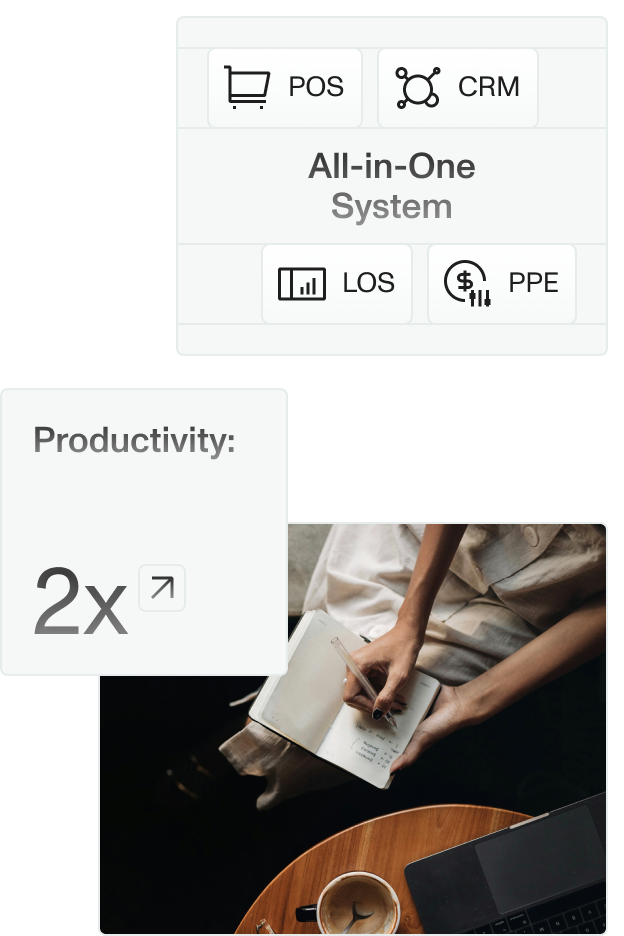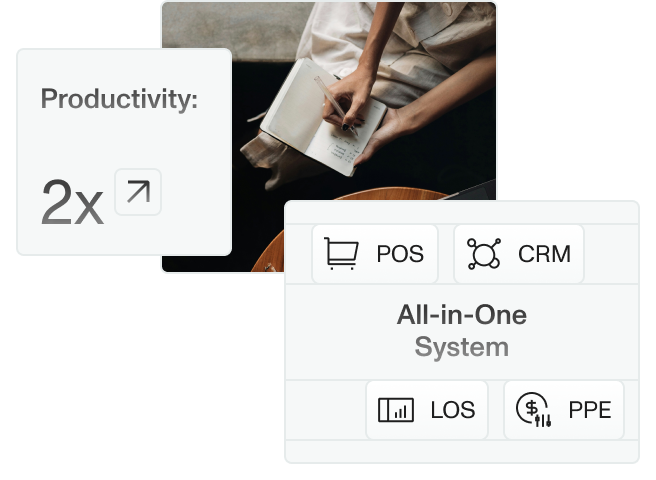The impact of technology integration into the business sphere cannot be overstated, and loan origination is no exception. Our business handles a lot of sensitive personal information and financial data that could lead to devastating consequences from bad actors.
Cybersecurity essentials such as defense tools and company best practices in loan origination have become a must-have for lenders who want their clients to feel their information is protected, not just because of legal requirements but as a pivotal aspect of maintaining trust. For today’s loan originators, choosing suitable cybersecurity tools should be considered a foundational component of a loan origination business.
Why Cybersecurity is Crucial for Mortgage Lenders
You can be the best loan originator in the world, but if your client’s information gets breached, leading to identity theft or worse, it will be the most memorable part of their experience with you – in the wrong way! Cybersecurity is essential for mortgage lenders for several reasons:
- Protecting Sensitive Client Data from Breaches: Loan originators handle vast amounts of personal and financial information, often sending it to various entities throughout the loan process. A breach can reveal sensitive data, leading to identity theft, economic loss, and possible legal consequences.
- Maintaining Client Trust and Business Reputation: In today’s era of social media and online review platforms like Google My Business, an unfortunate cybersecurity incident can damage a lender’s reputation beyond repair. Clients expect their personal information to be secure, and any failure to do so will lead to a loss of trust and have your customers engaging your competitors about your cybersecurity protocol.
- Ensuring Compliance with Legal and Regulatory Requirements: Mortgage lenders are beholden to cybersecurity laws and regulations. Negligence or oversight is not an excuse under these parameters, and non-compliance can result in hefty fines and legal penalties.
Common Cyber Threats in the Loan Origination Industry
Unfortunately, hackers are only getting more sophisticated through the development of AI and other tools of deception. The following list describes some classic tactics that have taken on new approaches as technology advances.
- Phishing: Phishing usually involves deceptive emails or messages (i.e. texts) designed to trick individuals into revealing sensitive information or damaging actions, such as paying an illegitimate source. Loan originators must be vigilant in recognizing phishing attempts, which often mimic the look, feel, and tone of legitimate communications from clients or financial institutions.
- Malware: Malware can include malicious and damaging software such as viruses and spyware. It infiltrates a system through email attachments, compromised websites, or infected downloads—sometimes as part of a more robust phishing attempt. A great defense against malware is regularly updating antivirus software, and avoiding suspicious links. A cybersecurity essential for this is to set up your company’s email spam filters to recognize when an incoming email contains dangerous or harmful content.
- Ransomware: A ransomware attack encrypts a victim’s data and demands payment for its release. This can destroy your loan origination business operations, leading to significant financial losses and temporary or permanent operational shutdowns. Committing to a process of backing up information, making duplicates of those backups, and thinking through recovery solutions can help mitigate or avoid ransomware attacks.
- Data Breaches: Data breaches occur when unauthorized individuals access sensitive information. The Equifax breach, which exposed the sensitive information of over 147 million people, is a tangible example of the consequences of mediocre and underperforming cybersecurity measures. Loan originators must prioritize data protection to avoid similar incidents.
Best Practices for Securing Client Information
There are many digital equivalents to some of the measures we’ve taken to protect physical assets. For example, we often stash our gold in a safe. In the digital world, an online safe exists to encrypt data for similarly crucial assets.
Protecting client information effectively is not a set-it-and-forget-it task but rather an ongoing one inclusive of the following best practices:
- Password Management: Using strong, unique passwords for each account is mandatory. Password managers can help generate and store complex passwords, reducing the risk of unauthorized access. You should avoid too much overlap of passwords and be willing to change them to keep the target moving for hackers regularly.
- Encryption: Encrypting data at rest and in transit ensures that even if data is intercepted, it remains unreadable to unauthorized parties. You wouldn’t leave a critical financial document unattended at someone’s door. You shouldn’t leave it unencrypted in someone’s email inbox.
- Secure Data Storage: Securely storing client information includes using encrypted databases and secure servers while regularly updating security protocols to protect against new and existing threats.
- Secure Transmission: Ensure that all communication channels are secure, especially if you’re on the road working on public or unsecured WiFi networks. Virtual Private Networks (VPNs) and encrypted email services can protect data during transmission, reducing the risk of interception. In the next section, we go over additional security software tools.
- Security Audits: Regular audits, staff training, and updating security policies are cybersecurity essentials in maintaining compliance. Loan originators should document all cybersecurity measures to demonstrate their commitment to regulatory standards.
Tools and Technologies to Enhance Cybersecurity
Your job and business require a lot from you. You can only commit so much time to the different aspects of your business, cybersecurity included. Since you don’t have unlimited time to dedicate to cybersecurity, investing in defense software like the VPNs we described above can be an additional protection against cyber threats. Let’s review a few more:
- Antivirus Software: Antivirus software is your first line of defense against malware. Loan originators should select reliable software to create a uniform defense system company-wide.
- Firewalls: Firewalls are a barrier between secure internal and untrusted external networks. They help prevent unauthorized access and protect against cyber attacks.
- Multi-Factor Authentication (MFA): MFA adds an extra layer of security by requiring additional verification steps, such as a fingerprint scan or a one-time code, before granting access. You may have experienced this when using a modernized laptop with a fingerprint biometric to open up the laptop’s interface.
Incident Response and Recovery
Unfortunately, even if you do everything right, breaches happen. When they do, it’s imperative that you get ahead of the situation with a well-thought-out incident recovery protocol. This could be the difference between a minor deal and a major deal, both for your customers’ security and non-compliance fees and fines.
- Have an Incident Response Plan: An incident response plan outlines the steps to take in the event of a cyber attack and the relevant parties at your company supporting each step. It’s important that all team members know their roles and can act quickly to contain the breach.
- What to Do After a Cybersecurity Incident: After an incident, loan originators should immediately isolate affected systems, assess the extent of the breach, and notify relevant parties, including clients and regulatory bodies. Don’t bury the information; withholding the unfortunate circumstances will only make the situation worse.
- Communication Strategies: If a breach occurs, transparent and direct communication is key to reestablishing trust. After the initial message indicating a breach, loan originators should provide timely updates to clients and stakeholders, outlining the steps being taken to resolve the issue and the progress of recovery attempts.
- Long-Term Recovery and Prevention Measures: Post-incident, it is a good idea to review and update security protocols with your company’s key stakeholders to prevent future breaches. In the world of hacking, many bad actors often use similar practices. If one of them is able to breach your cybersecurity defense, another one might be right around the corner. Consider new technologies, enhance staff training, and schedule more frequent cybersecurity audits if a breach occurs.
Building a Culture of Cybersecurity in Your Organization
Like any other aspect of a company, cybersecurity affects your loan origination business’ company culture, from employees feeling their data is protected to knowing they can confidently work with their clients.
What can you do to boost this company culture so that your employees and customers feel safe operating within the digital environment you’ve created?
- Lead by Example: Management plays a crucial role in promoting mortgage lender cybersecurity. Emphasizing and prioritizing cybersecurity can set the tone for the entire organization.
- Encouraging Reporting of Suspicious Activities: Employees should feel empowered to report suspicious activities without fear of reprisal. Establishing a clear reporting protocol can help detect and address threats early.
- Regularly Updating Policies and Procedures: Cyber threats are constantly evolving, so loan originators should regularly review and update cybersecurity policies and procedures. This ensures that they stay ahead of potential risks. It’s best to be proactive, not reactive.
Cybersecurity essentials are dedication, the right tools, and a commitment to protecting client information. For loan originators, implementing cybersecurity measures is not just a regulatory requirement—it’s a critical component of maintaining trust. Loan originators can significantly reduce the risk of cyber incidents by staying informed about common threats, adhering to best practices, and fostering a culture of security.Sonar understands the importance of cybersecurity in the loan origination industry. Our state-of-the-art security solutions protect your business and your clients’ data. If you’re ready to upgrade your cybersecurity tools, click here to try a demo.








